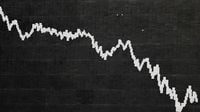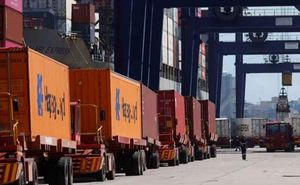Frankfurt's DAX index experienced a sharp decline on Thursday, April 3, 2025, plummeting 2.44% to 21,845 points, as investors reacted to the sweeping tariff announcements made by U.S. President Donald Trump. This marked the index's lowest level in nearly two months, with market sentiment shaken by fears of a trade war and its potential economic repercussions.
On April 2, 2025, President Trump announced a new wave of tariffs, including a 10% baseline duty on all imports and a staggering 20% tariff on European goods. The automotive sector faced particularly harsh penalties, with a 25% tariff on imported cars set to take effect immediately. This aggressive tariff strategy, aimed primarily at China, Taiwan, and South Korea, also impacted the European Union, raising concerns about retaliatory measures.
World leaders and economic analysts have expressed alarm over the implications of these tariffs. European Commission President Ursula von der Leyen stated, "We are already finalising the first package of countermeasures in response to tariffs on steel. And we’re now preparing for further countermeasures to protect our interests and our businesses if negotiations fail." The potential for a trade war has left many investors seeking safer assets, leading to a noticeable flight from equities.
The immediate fallout from Trump's tariff announcements was felt across various sectors. German auto stocks were particularly hard hit, with Porsche leading the losses, tumbling 2.70%. Other major players like BMW, Mercedes-Benz Group, and Volkswagen also saw significant declines. Additionally, the financial sector was not spared, with Commerzbank and Deutsche Bank plunging 5.52% and 5.82%, respectively.
As markets digested the shock of the tariffs, attention turned to the upcoming monetary policy meeting minutes from the European Central Bank (ECB). Investors are keen to assess how the combination of softer inflation and heightened tariffs might influence ECB policy. A weaker euro against the dollar could potentially enhance export competitiveness, somewhat offsetting the impact of the tariffs.
In the U.S., equity markets had advanced on April 2, ahead of Trump's tariff announcements. The Nasdaq Composite Index gained 0.87%, while the Dow and the S&P 500 rose by 0.56% and 0.67%, respectively. However, following the tariff news, U.S. futures indicated a sharp decline, with Dow Jones Futures plunging 917 points and Nasdaq 100 Futures tumbling 665 points ahead of the European opening bell.
Economists are now closely monitoring labor market indicators, with initial jobless claims expected to rise to 225,000 for the week ending March 29, up from 224,000 the previous week. A significant spike above 250,000 could heighten recession fears, increasing the likelihood of multiple Federal Reserve rate cuts in 2025. Conversely, if claims drop below 220,000, it may signal a more hawkish stance from the Fed.
In addition to jobless claims, the ISM Services PMI is forecasted to slip to 53.0 in March, down from 53.5 in February. A larger-than-expected decline below the neutral 50 level could further unsettle investors already grappling with recessionary fears. Analysts are also considering trends in prices and employment, as softer metrics could indicate weaker inflation and support a dovish Fed stance.
The DAX's trajectory will depend heavily on the evolving trade situation, central bank policies, and economic data releases. As of Thursday, the DAX had opened below the 50-day Exponential Moving Average (EMA) but remained above the 200-day EMA, suggesting bearish near-term momentum while the longer-term trend remains intact. A breakout above 22,000 could signal a recovery toward the 50-day EMA, while a drop to 21,750 might indicate a further decline toward 21,500, potentially opening the door to 21,000.
Market analysts are keeping a close watch on macroeconomic indicators and central bank updates. With volatility on the rise, the DAX's performance will be influenced by any developments in U.S.-China trade relations and the ECB's monetary policy direction.
In Asia, markets reacted negatively to the tariff announcements, with Japan's Nikkei Index falling 2.8% to 34,735 points. The Hang Seng Index in Hong Kong decreased by 1.5%, while the CSI-300 Index of mainland Chinese stocks fell by 0.5%. China responded to the tariffs by demanding the U.S. withdraw its measures, warning of countermeasures to protect its interests.
In the commodities market, the price of gold surged to a record high of $3,157.23 per ounce, as investors sought safe-haven assets amid rising uncertainties. Conversely, crude oil prices for North Sea Brent and U.S. light oil WTI fell by approximately 2.5%, reflecting concerns about the economic impact of the tariffs.
As the situation continues to unfold, market participants will be watching for signs of escalation or de-escalation in trade tensions, as well as any hints from the ECB regarding future monetary policy adjustments. The interplay of these factors will be crucial in determining the DAX's direction in the coming weeks.
In corporate news, Siemens announced its acquisition of Dotmatics for $5.1 billion, a move aimed at bolstering its automation technology business. Meanwhile, Nintendo is set to launch its new Switch 2 console on June 5, 2025, priced at approximately 470 euros.
As the global economic landscape shifts in response to the U.S. tariffs, the implications for various sectors and economies will be significant, necessitating close scrutiny from investors and policymakers alike.






